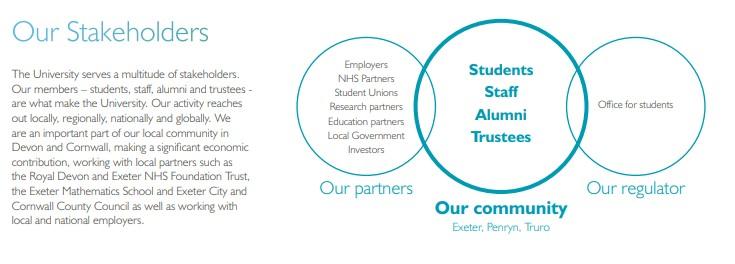This blog was originally published by the IIRC and has been adapted for Advance HE.
The case for senior leadership – boards and senior management – to take account of the legitimate and reasonable ‘needs, interests and expectations’ (NIEs) of its primary stakeholders has been evidenced and articulated by many thought leaders, and underpins the paradigm shifts in the corporate world identified in King IV:
“…the CSRO (corporate stakeholder relationship officer) informs management of the stakeholders’ NIEs and does a written report to the board on the quality of the relationships. At every board meeting there should be an agenda item “Stakeholder relationships.” This will result in the board having an oversight which is informed in regard to managements’ proposals on strategy.” (Measuring Relationships: a route to competitive advantage and reduced risk, Professor Mervyn King, IIRC, 2017)
Most Corporate Governance codes already include, or are moving towards, requirements for Boards to have responsibilities around stakeholder/shareholder assurance in relation to understanding and engagement.
The CUC Code of Governance, requires that, ‘Governing bodies understand the various stakeholders of the institution (globally, nationally and locally) and are assured that appropriate and meaningful engagement takes place to allow stakeholder views to be considered and reflected in relevant decision-making processes'.
Advance HE has undertaken 38 Governance Effectiveness Reviews across all types of HE provider since 2018 – we see and hear three key issues on this subject:
- Local stakeholders might be understood, engaged with and courted, but there is less emphasis on national or global issues, influences or perspectives.
- Or conversely, global and national role and impact is understood, but less so the civic one
- Especially pertinent in the wake of Covid 19 – are boards genuinely hearing and understanding nearly enough (in an evidence based way) about a diverse range of experiences to a) inform strategy or b) test academic assurance.
First and foremost, senior leadership must ask itself the question
‘How well would you rate your governing body’s understanding of its stakeholders?’ For example do we articulate a short list which might include but not limited to key groups in a similar way to the University of Exeter, as outlined in their Annual Report.

Once you have tackled that question, you can then go on to ask these questions:
- How well does the Board understand – and get assurance about stakeholder engagement to inform decision making?
- Does the understanding take account of diverse perspectives within stakeholder groups, e.g. post graduates, mature students or minority groups?
- Does the senior leadership (governors and executive) consider what is material/important to each stakeholder group and use this to inform its work? How do you know? What evidence does the Board have?
- As Boards, do we in our work appreciate the full range of our stakeholders? – and at a level which takes into account diverse perspectives even within stakeholder groups?
So what are the benefits? – Increasing your understanding and engagement of stakeholders allows you to be more confident in your strategy and the value you want to create, as well as tell your story better.
It helps an organisation build trust and make informed decisions which ensure that the senior leadership – the executive team and governing body – remain transparent and focussed on purpose and strategic oversight.
In an interview with Professor John Stanhope, Chancellor and the Chair of the board of Deakin University Australia, and Co-Deputy Chair of the IIRC Council, I explored the Board's role in stakeholder assurance/engagement, particularly in the context of strategic organisational transformation.
The power of listening: John emphasised the importance of getting the basics right, and that includes listening and reflecting on what you hear. In his book '7 habits of highly effective people’, Steven R Covey suggests that “people usually listen with the intent to reply, not to understand”. He recommends, “seek first to understand, then to be understood”. This can be key in understanding whether the organisation is clearly articulating its value to stakeholders.
The challenge for governing bodies: John also challenged HE governing bodies to question their own understanding and to be able to recognise whether there were gaps in their understanding of stakeholders, and furthermore to recognise where there might be shortcomings in the assurance that they are getting from the executive team.
You can listen to our discussion here.
If we are to meet the expectations of good governance which Mervyn King and John Stanhope allude to, we must put in place a robust and transparent way to assure that we can listen, reflect and respond with purpose to our stakeholders, whoever they are.